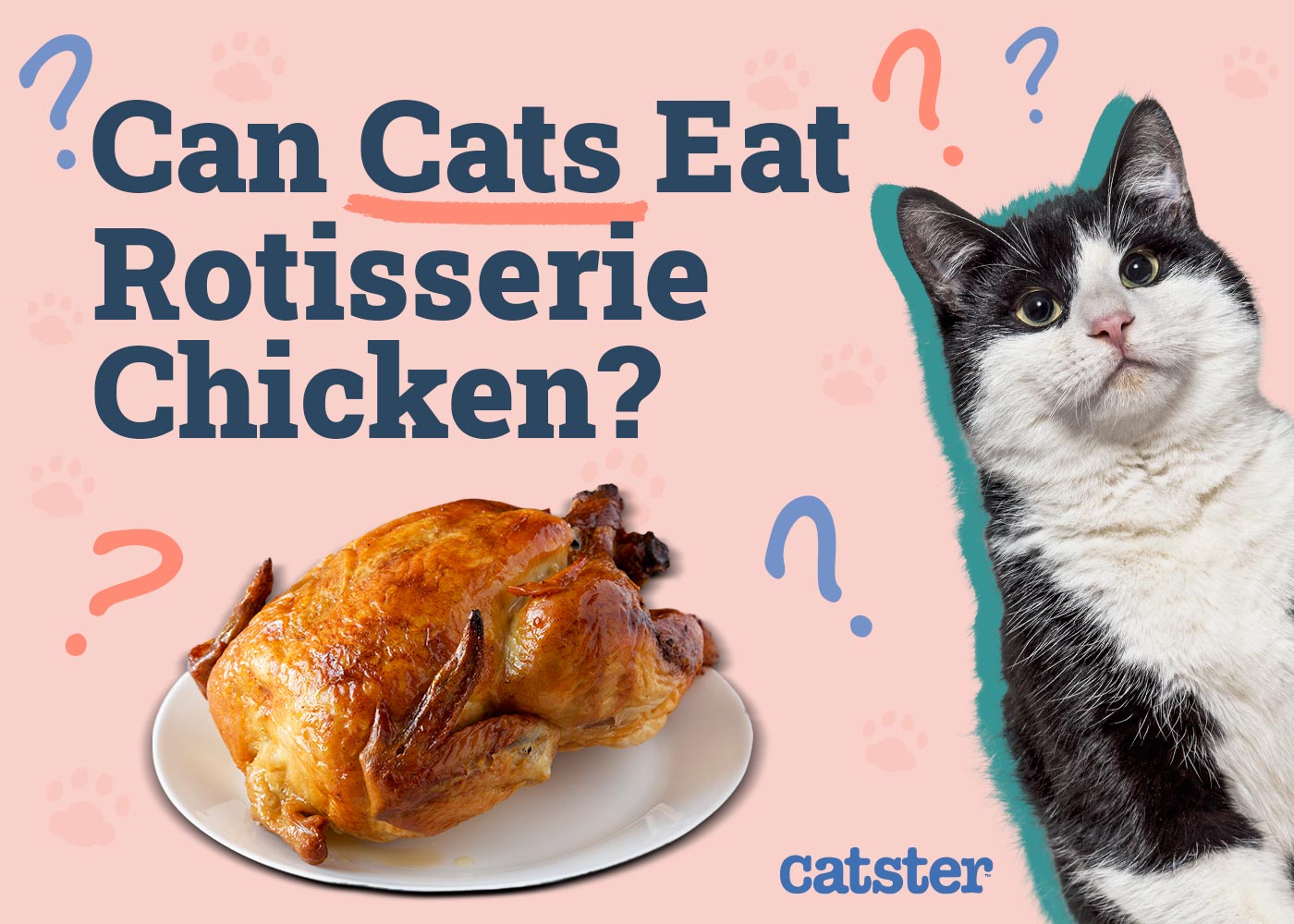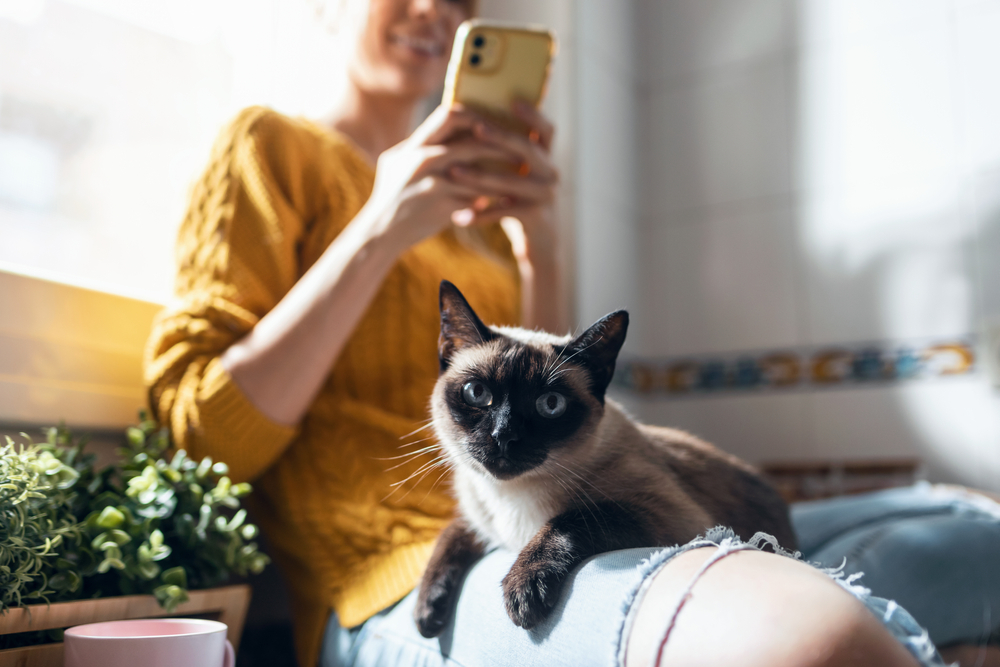Rotisserie chicken is a delicious and versatile food that many humans regularly consume. Just the smell of fresh, warm rotisserie chicken brings most cats running, but is it okay for cats to eat?
While plain chicken is a healthy protein that’s fine for cats to enjoy occasionally, rotisserie chicken is often high in sodium and other seasonings, which aren’t great for cats to consume in excess, if at all. This means rotisserie chicken should not be given to cats.
Wait, Rotisserie Chicken Has Lots of Salt?
Rotisserie chickens are usually injected with a solution that contains salt and sometimes sugar. Companies have a unique way of preparing these products; some featuring more salt than others. Some rotisserie chickens have more than 500 mg of sodium in just one 3-ounce serving.
Although cats do need sodium as part of their diet, those requirements are generally met by feeding them a nutritionally balanced diet. Anything in excess of this is unnecessary, and could even be harmful.
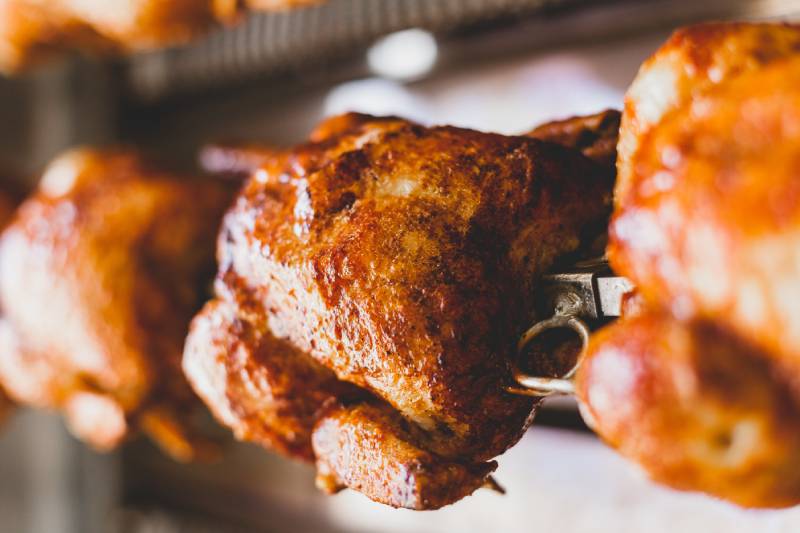
But Cats Eat Chicken All the Time!
Cats are carnivores; in the wild, they primarily eat animals like mice, birds, and other small mammals. Their bodies are optimized for digesting protein from animal sources to obtain nutrients.
Protein is at the top on the feline list of nutritional requirements, and chicken is a reasonable choice for most cats, making it one of the most common ingredients used in commercial cat foods. The problem isn’t in the chicken per se, but in all the extras that are added when preparing it rotisserie style.
Plain chicken can be a healthy treat for your cat, but it should not replace their regular food because it does not contain all the nutrients they require. You can cook chicken by boiling or baking, removing any bones, and giving your cat’s small bites as an occasional treat.
Plain, boneless and skinless turkey is another relatively healthy option that most cats can enjoy as a treat. Be sure to talk to your vet before adding any foods to their diet to make sure you are giving healthy choices in proper quantities, particularly if your cat is on a special diet or has any health conditions.
What About Rotisserie Chicken Skin?
Rotisserie chicken skin is an absolute no-no. It’s really high in fat and is often seasoned with spices that can make cats quite sick. High-fat foods can lead to upset stomachs, vomiting, and diarrhea in cats, and if fed regularly, can lead to weight gain.
Depending on the recipe, the skin may be rubbed with garlic or onion powder before cooking to add a touch of flavor. Garlic and onions are toxic to cats, particularly in powdered form, and can make them extremely sick in surprisingly small amounts.
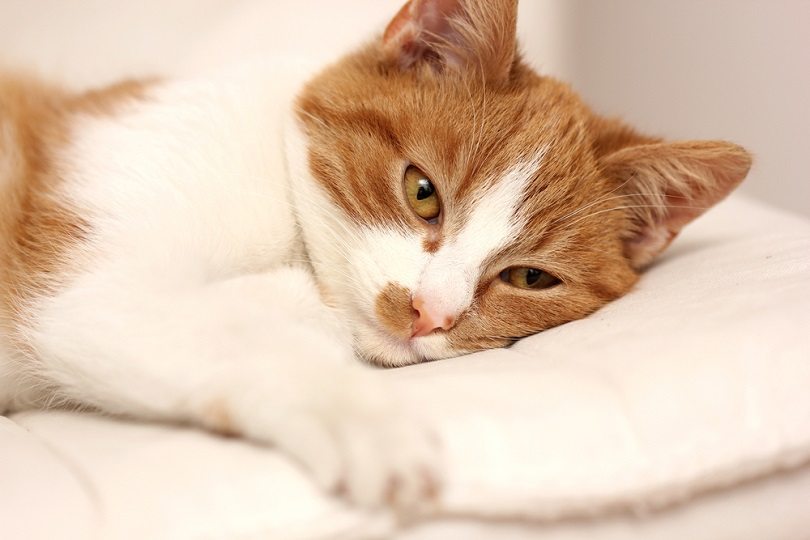
What Sorts of Human Foods Can Cats Eat?
You can treat your cat to “human” food in several ways. Make sure to restrict the amount of treats your buddy gets to less than 10 percent of their diet to keep them nice and fit!
Eggs
Cats can eat eggs as long as they’re prepared in safe ways. The same rules generally apply when preparing all “human” foods for cats: keep the recipes as simple as possible, avoid adding ingredients, and avoid cooking in fats and oils. A healthy adult cat can safely enjoy a nibble or two of an unsalted, hard boiled egg or a tiny bite of plain scrambled eggs.
Meat and Fish
Just because rotisserie chicken is off the menu, that doesn’t mean that we can’t offer our cats some plain chicken and other meats. As mentioned above, plain, boiled chicken can be a very popular treat for our feline friends, as can small portions of other types of plain cooked meat. Just avoid fatty cuts, smoked, cured, or salted products.
Canned tuna in spring water is another tasty option that will drive your kitty crazy. Avoid any fish kept in oil or other flavors, and never feed your cat raw fish; it can contain bacteria or parasites.
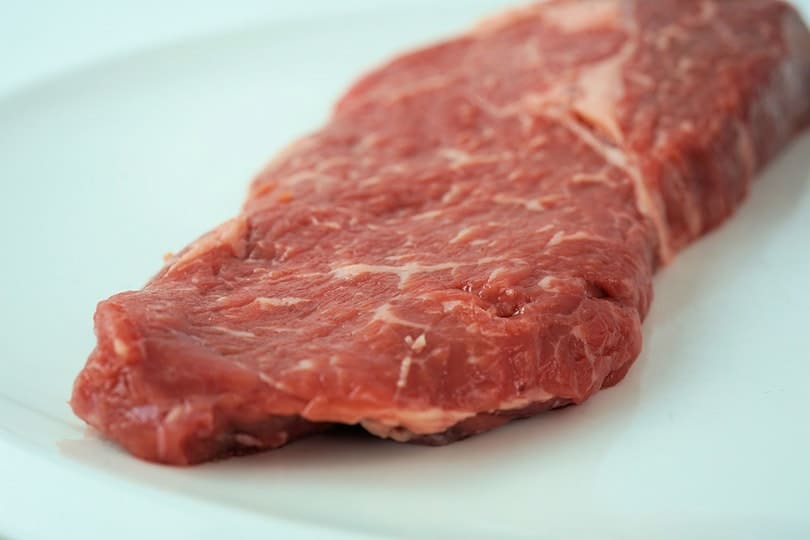
Vegetables
Many, but not all, vegetables are safe for cats to eat. Plain pumpkin and sweet potatoes are also okay as special occasion goodies, and can even help with digestive health.
FAQ’s
What if my cat eats rotisserie chicken?
If your cat manages to steal (or even sweet talk) a piece of your rotisserie chicken, it is unlikely that they will suffer any major problems, unless they have particularly sensitive stomachs, or if they manage to eat a large amount. Monitor them closely over the next 24 hours for any signs of gastrointestinal problems such as vomiting, diarrhea, or abdominal pain. If these signs are severe or persist for more than 24 hours, you should make an appointment with your vet.
If your cat manages to eat a large amount of rotisserie chicken (more than ¼ of a chicken), you should contact your vet for advice, particularly if they have eaten any bones. Eating a large, fatty, and salty meal could lead to severe, acute gastrointestinal distress, liver problems, or pancreatitis, and ingesting cooked bones could result in damage to the intestines or even choking.
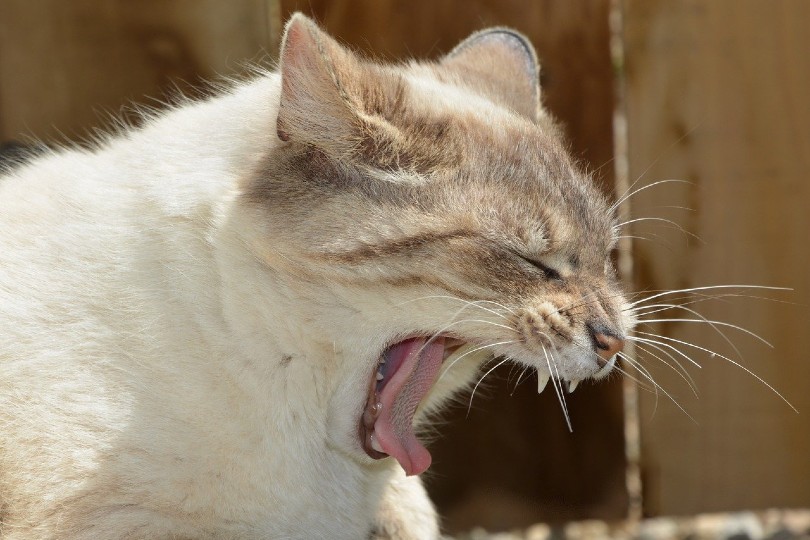
Can cats be allergic to chicken?
Food allergies and intolerances are a fairly uncommon issue in cats, but they can occur. Food allergies often take time to emerge, so cats can develop reactions to foods that they haven’t had problems with in the past. Proteins such as chicken and beef are some of the most common triggers of feline food allergies. Signs of feline food allergies include itchy skin, frequent ear infections, and sometimes gastrointestinal problems.
How are food allergies diagnosed in cats?
Diagnosing food allergies can be quite tricky. It usually involves following a special elimination diet and reintroducing ingredients to see if there’s a reaction. Special hypoallergenic diets and allergy testing are available as well.
How are food allergies treated in cats?
Managing the condition usually involves avoiding the food that causes problems. Allergies can’t be cured, so the goal is largely to prevent exposure to what causes reactions. This may include special allergy or novel protein diets. For this reason, you should avoid feeding your cat a huge array of different protein types. Variety may be the spice of life, but the more different types of meat that are included in your cat’s regular menu, the fewer options there will be if we ever need to switch them to a novel protein diet.
Conclusion
Rotisserie chicken shouldn’t be intentionally given as a treat to cats. However, most healthy adult cats will be fine if they happen to snatch a bite or two. Just be sure to monitor them for signs of digestive issues, such as vomiting or diarrhea, especially if they nab more than a couple bites or ingest some of the skin. Contact your vet if your cat is showing severe signs or signs that last longer than a couple of days.
Rather than rotisserie chicken, you may treat your cat to the occasional bit of plain, cooked chicken breast. Just be sure to keep treats as an occasional food and not part of their regular diet.
Featured Image Credit: Liudmyla Chuhunova, Shutterstock
Contents
- Wait, Rotisserie Chicken Has Lots of Salt?
- But Cats Eat Chicken All the Time!
- What About Rotisserie Chicken Skin?
- What Sorts of Human Foods Can Cats Eat?
- FAQ’s
- What if my cat eats rotisserie chicken?
- Can cats be allergic to chicken?
- How are food allergies diagnosed in cats?
- How are food allergies treated in cats?
- Conclusion

